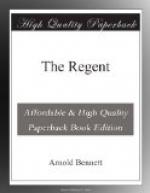Weakly he consulted yet again the programme. Only one character bore a name familiar to the Don Juan story, to wit “Haidee,” and opposite that name was the name of Elsie April. He waited for her—he had no other interest in the evening—and he waited in resignation; a young female troubadour (styled in the programme “the messenger”) emerged from the unseen depths of the forest in the wings and ejaculated to the hero and his friend, “The Woman appears.” But it was not Elsie that appeared. Six times that troubadour-messenger emerged and ejaculated, “The Woman appears,” and each time Edward Henry was disappointed. But at the seventh heralding—the heralding of the seventh and highest heroine of this drama in hexameters—Elsie did at length appear.
And Edward Henry became happy. He understood little more of the play than at the historic breakfast-party of Sir John Pilgrim; he was well confirmed in his belief that the play was exactly as preposterous as a play in verse must necessarily be; his manly contempt for verse was more firmly established than ever—but Elsie April made an exquisite figure between the castle and the forest; her voice did really set up physical vibrations in his spine. He was deliciously convinced that if she remained on the stage from everlasting to everlasting, just so long could he gaze thereat without surfeit and without other desire. The mischief was that she did not remain on the stage. With despair he saw her depart, and the close of the act was ashes in his mouth.
The applause was tremendous. It was not as tremendous as that which had greeted the plate-smashing comedy at the Hanbridge Empire, but it was far more than sufficiently enthusiastic to startle and shock Edward Henry. In fact, his cold indifference was so conspicuous amid that fever that in order to save his face he had to clap and to smile.
And the dreadful thought crossed his mind, traversing it like the shudder of a distant earthquake that presages complete destruction:
“Are the ideas of the Five Towns all wrong? Am I a provincial after all?”
For hitherto, though he had often admitted to himself that he was a provincial, he had never done so with sincerity: but always in a manner of playful and rather condescending badinage.
III
“Did you ever see such scenery and costumes?” someone addressed him suddenly, when the applause had died down. It was Mr. Alloyd, who had advanced up the aisle from a back row of the stalls.
“No, I never did!” Edward Henry agreed.
“It’s wonderful how Givington has managed to get away from the childish realism of the modern theatre,” said Mr. Alloyd, “without being ridiculous.”
“You think so!” said Edward Henry, judicially. “The question is—has he?”
“Do you mean it’s too realistic for you?” cried Mr. Alloyd. “Well, you are advanced! I didn’t know you were as anti-representational as all that!”




